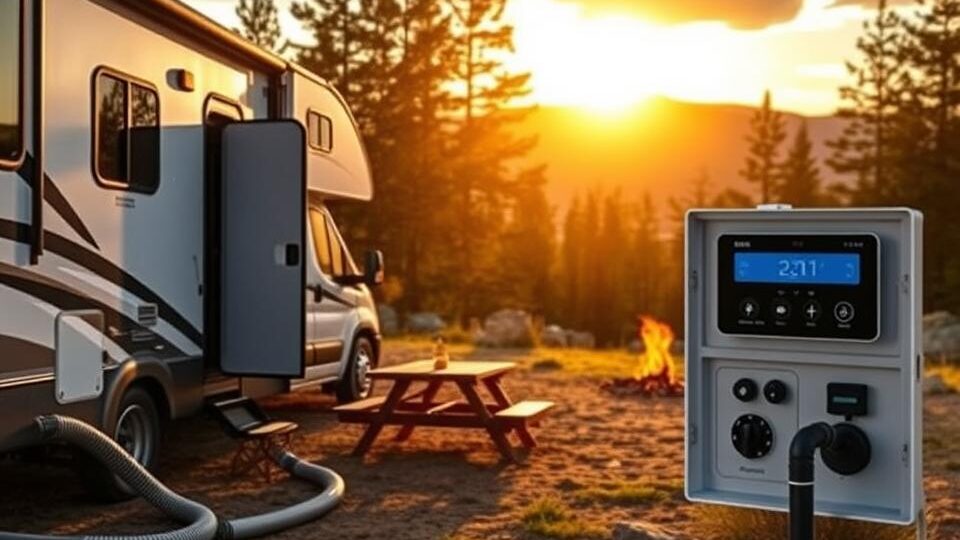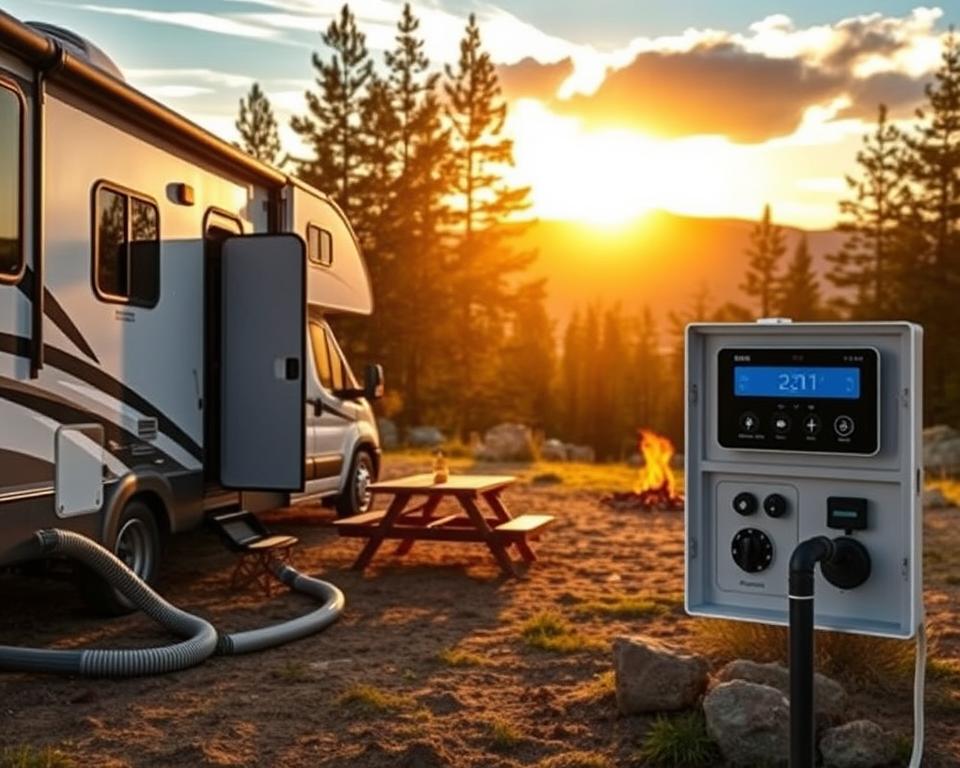
Simple DIY Fixes for Minor Springville RV Sewer Pump Problems You Can Handle
Camper Waste Pump Manual: Vital Upkeep Recommendations
Have you given thought to the workings of your recreational vehicle sewage network? Grasping the details of your camper sewer pump can sidestep mishaps, uplifting your camping excursions. It focuses on overseeing waste efficiently and dodging foul smells. By following this guide, you’ll discover critical maintenance techniques for RV holding tank pump out service. All are created to maintain your sewage system’s optimal function.
Comprehending Your Camper Waste Pump Configuration
The camper sewage pumping setup is crucial for sewage control, making outdoor stays more convenient. It includes two primary tanks: the sewage holding tank for bowel output and the sink/shower runoff tank for water from wash basins and shower stalls. Distinguishing between these tanks is crucial to prevent clogs and keep your RV functioning efficiently.
An camper macerator unit is a favored option for sewage handling. It grinds solid waste into minute particles, streamlining disposal. Alternatively, a standard waste pump is available. It effectively moves waste without pulverizing, for those preferring a simpler option.
Understanding your RV’s waste pump setup is essential to preventing problems and ensuring clean inspections. Handling the system properly can prevent messes, improving your outdoor adventures.
Value of Regular Service
Servicing your RV sewage disposal pump is crucial for a hassle-free adventure. Without proper servicing, you may run into odors, clogs, or backups. These complications can spoil your road trips.
Scheduled upkeep avoid such complications and extend your system’s life. By inspecting hoses and seals, you enhance efficiency. A properly cared-for RV sewage pump ensures smooth waste disposal, letting you enjoy uninterrupted travels.
Frequent upkeep also brings financial savings over time. Disregard can cause significant problems, requiring expensive replacements. Committing to regular maintenance keeps your motorhome in optimal state, conserving money long term.
When to Empty Your RV Septic Tank?
Understanding when to empty your RV Septic tank is crucial for its upkeep. It’s best practice to pump every three to five days during use. For short trips, pumping on return may suffice.
Interval depends on different variables. Tank capacity and occupancy are key. Preferably pump when it reaches two-thirds full. This helps support smooth flow and avoid obstructions.
Monitoring your RV tank fill level is vital for a stress-free outing. Handle your camper’s waste to stop issues while traveling.

Optimal Methods for Tank Disposal
Safely purging RV tanks is essential for your motorhome’s sanitary condition and reliability. Start with the black water tank to let the grey tank liquid rinse leftover solids. This technique prevents clogs and ensures smooth operation.
Opt for a high-quality sewer hose for disposal. A sturdy hose avoids leaks and locks connections. Attach a tank rinser for a intensive cleanse, using water pressure to remove residual sludge, upgrading cleanliness.
Full discharge prevents residue buildup, warding off foul odors and potential issues. To maintain an efficient sewage system in your motorhome, follow these guidelines:
- Regularly use a tank treatment to keep odors at bay and break down waste.
- Watch capacity to avoid spills.
- Inspect your RV waste pump regularly for clogs and wear.
- Perform a deep tank flush every 4–8 weeks, even during infrequent outings.
Adopting these techniques enhances your sewage system’s lifespan and performance, ensuring memorable excursions.
Preventing Odors and Clogs
For a memorable adventure, preventing foul aromas is crucial. Keep enough water in tanks to aid in breaking down waste, preventing unpleasant odors. Also, opting for RV-approved tissue helps prevent clogs, avoiding backups.
For improved waste handling in campers, try bio-agent additives. These process sludge thoroughly, easing upkeep. Check the vent line often to keep air moving freely in the plumbing system.
Cautious flushing is essential to avoiding tank issues. Do not flush wipes, feminine products, and paper towels. These non-compostable materials can cause major clogs. Following these tips helps maintain a cleaner camping environment.
Maintenance Advice for RV Sewage Pumps
Maintaining your RV’s sewer pump system is key for smooth journeys. Check valve seal integrity often to prevent leaks. Leaky seals can cause accidents, harming your RV.
To remove stench and maintain cleanliness, sanitizing is key. Perform a deep clean every few months to prevent buildup, ensuring the system works efficiently. These steps are imperative for maintaining a mobile macerator, promoting durability and optimal performance.
Greasing valve components is another essential task. It helps prevent leaks and improve functionality. Checking sensor accuracy is essential for exact data, preventing overflows and unexpected pump issues. Maintaining vigilance makes your RV adventures neater and more enjoyable.
Signs You Might Need a Professional Pump-Out
Identifying septic problems ahead can save you from bigger headaches. A primary clue you need a expert emptying is sluggish flow. When sinks and toilets take longer to clear, it often points to clogs. It suggests your system may be full.
Persistent odors are another obvious clue of sewage troubles. Unpleasant fumes hanging around despite cleaning suggest trapped waste. It’s crucial to check the transparent elbow fitting when dumping waste. Remaining waste visibility signals it’s time for expert emptying.
Technicians employ water-jet systems to dismantle stubborn blockages efficiently. Ignoring these warnings can snowball major problems. Therefore, it’s vital to seek help immediately when issues arise.
| Indicators of Sewer Trouble | Recommended Response |
|---|---|
| Sluggish Emptying | Check obstructions; call expert service |
| Ongoing Foul Scents | Inspect fittings; schedule pump-out |
| Remaining Sludge | Arrange expert emptying and cleaning |
Selecting the Ideal RV Waste Grinder
When choosing an RV macerator pump, consider its volume handling, build quality, and compatibility with your RV’s size. A premium macerator is vital for effective waste grinding. This is especially true for RVs requiring regular emptying. High-end pumps improve sewage handling, ensuring a better travel experience.
A range of options cater to specific demands. For an educated choice, focus on these critical elements:
- Capacity: Ensure the pump can handle your RV’s waste output.
- Durability: Opt for models built to endure travel demands.
- Ease of Use: Select pumps with intuitive controls.
- Compatibility: Ensure it integrates with your system.
Investing time in research when choosing an RV macerator pump enhances travel enjoyment and ensures effective waste management.
RV Sewer Pump Problem-Solving
Effective problem-solving for your RV sewer pump is crucial in rectifying common sewage issues before they worsen. If you notice slow drainage, unplanned backflows, or persistent odors, act quickly. These are clear signs of malfunction requiring attention.
Begin by examining the pump, its connections, and hoses. Check for any clogs that could slow flow. Ensure inlet and outlet fittings are properly connected. Also, verify the pump’s power supply for consistency.
If basic checks don’t uncover the issue, note the pump’s sound. A unit that’s overly noisy or too quiet may have internal damage. Also, check for leaks, as these can exacerbate sewage problems. With these troubleshooting steps, many RV owners identify and fix issues early, avoiding costly repairs.
Extended RV Pump Upkeep
For extended service life, dedicate yourself to regular sewer pump upkeep. Sanitize the system consistently to prevent clogs. Set up and follow a maintenance routine, keeping everyone informed of their roles. This markedly boosts your waste system’s lifespan.
Informing yourself and others on proper waste disposal is key. This avertss issues and fosters shared responsibility. The result benefits both users and the sewer system.
- Regularly check hoses and fittings
- Flush and clean filters often
- Arrange yearly pro maintenance
- Using appropriate tank treatment chemicals
Abiding by these practices boosts your camper’s sewage system’s durability and keeps it healthy, making travels more enjoyable.
Conclusion
Maintaining your camper’s waste pump properly is vital for seamless camping adventures. Regular attention to RV sewer system maintenance greatly minimizes problem risks, letting you immerse in the journey. By understanding your system and using reliable sewage methods, your trips will be free of waste management woes.
Implementing the key tips from this guide promotes RV waste management and uplifts your travel comfort and safety. Ensure pump reliability by following best upkeep practices and fixing potential issues promptly.
Keeping informed about your RV sewer system is rewarding. It ensures homely comforts while exploring. Wishing you joyous and untroubled journeys!
Help Center
How can I tell it’s time to empty my RV Septic tank?
Pump the RV Septic tank when it hits 66% capacity.
Black tank vs. grey tank: what’s the difference?
Black tank is for sewage waste. On the other hand, the grey tank collects water from basins and showers.
What is the recommended maintenance schedule for RV sewer pumps?
Inspect and sanitize system about every three months.
What treatments should I use on my RV sewer system?
Opt for biological tank additives.
How to keep my camper’s sewer lines clog-free?
Avoid flushing non-biodegradable items.
What signs indicate I need professional RV pump-out?
Blockages, foul scents, or tank overflow warrant expert service.
How can I improve my RV macerator pump’s efficiency?
Ensure capacity and compatibility.
Deep cleaning checklist for RV sewer system?
Flush lines, replace seals, and sanitize components.
What long-term care tips help my RV sewer pump?
Train users on proper disposal.
How often should I empty my RV Septic tank with regular use?
Service tank frequently for group travel or heavy usage.